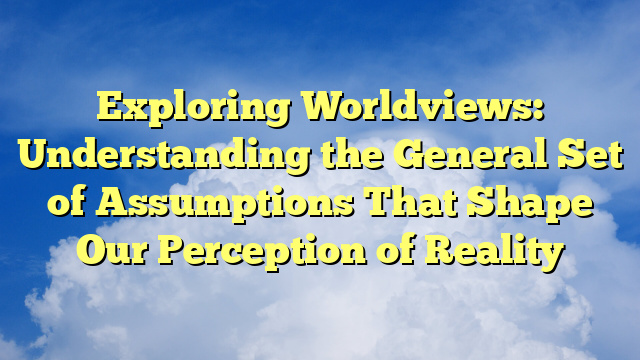Exploring Worldviews: Understanding the General Set of Assumptions That Shape Our Perception of Reality
Exploring Worldviews: Understanding the General Set of Assumptions That Shape Our Perception of Reality
Our worldview is the lens through which we perceive the world around us. It’s a complex set of beliefs, values, and assumptions that shape our understanding of reality. This article delves into the concept of worldviews, exploring their components, how they are formed, and why they matter.
What is a Worldview?
A worldview is a comprehensive perspective on life and the world. It encompasses our thoughts on the nature of reality, the existence of a higher power, the origin of life, moral values, and the meaning of life itself. Essentially, it’s the framework within which we make sense of our experiences and the world around us.
Components of a Worldview
- Metaphysics: This deals with questions of existence and the nature of reality.
- Epistemology: This focuses on the nature of knowledge and how we come to understand the world.
- Axiology: This involves values, ethics, and aesthetics, guiding our judgments of right and wrong, and what is considered beautiful.
- Theology or Philosophy: This addresses the existence of a higher power or the nature of the universe from a philosophical standpoint.
How Worldviews are Formed
Worldviews are not static; they evolve based on personal experiences, cultural influences, education, and social interactions. Let’s explore the key factors in the formation of worldviews.
Personal Experiences
Our direct experiences with the world around us can profoundly shape our worldview. Positive and negative life events can alter our perceptions and beliefs about the nature of reality and our place within it.
Cultural Influences
The culture we grow up in provides a set of lenses through which we view the world. Cultural narratives, traditions, and values play a significant role in shaping our worldview.
Education and Knowledge
Education broadens our horizons, introducing us to new ideas and perspectives. It plays a crucial role in shaping our understanding of the world and our place in it.
Social Interactions
Interacting with others, especially those from different backgrounds, can challenge and expand our worldviews. Through dialogue and exchange, we are exposed to diverse perspectives that can reshape our understanding of reality.
Why Worldviews Matter
Understanding our own worldview and those of others is crucial for several reasons:
Guides Behavior and Decision-Making
Our worldview influences our choices and actions. It serves as a guide for ethical decision-making and shapes our responses to life’s challenges.
Fosters Empathy and Understanding
Recognizing that others may have different worldviews helps us approach interactions with empathy and openness. It encourages respectful dialogue and mutual understanding.
Shapes Societal Norms and Policies
Collective worldviews influence societal norms, laws, and policies. Understanding the diversity of worldviews can lead to more inclusive and equitable societies.
Comparing Different Worldviews
Let’s briefly compare two broad categories of worldviews: materialist and spiritual.
| Aspect | Materialist Worldview | Spiritual Worldview |
|---|---|---|
| Nature of Reality | Physical and observable | Transcends physical reality |
| Source of Knowledge | Empirical evidence and science | Intuition, revelation, and faith |
| Values and Ethics | Derived from human reasoning and societal consensus | Based on spiritual or religious principles |
| Meaning of Life | Self-determined or nonexistent | Defined by a higher power or spiritual journey |
Conclusion
Exploring and understanding worldviews is a journey into the heart of what it means to be human. By examining the assumptions that shape our perception of reality, we gain insights into ourselves and the diverse world around us. Recognizing the complexity and diversity of worldviews can lead to a more empathetic, understanding, and inclusive world.

